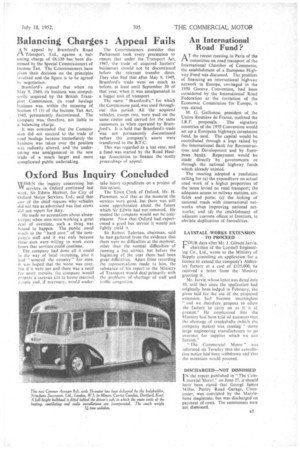An International Road Fund ?
Page 39

If you've noticed an error in this article please click here to report it so we can fix it.
AT the recent meeting in Paris of the committee on road transport of the International Chamber of Commerce, the establishment of a European Highway Fund was discussed. The problem of financing an international highway network in Europe, envisaged in the 1950 Geneva Convention, had been considered by the International Road Federation at the invitation of the Economic Commission for Europe, it was stated.
M. G. Gallienne, president of the Union Routiere de France, outlined the I.R.F. proposals. The signatory countries of the 1950 Convention would set up a European highways investment fund, he said. The capital would be contributed through a loan raised by the International Bank for Reconstruction and Development and by European banks. Repayment would be made directly by governments or through the national highway funds which already existed.
The meeting adopted a resolution calling for (a) the expenditure on actual road work of a higher proportion of the taxes levied on road transport; (b) adequate access to railway stations, airfields and ports; (c) the linking of national roads with international networks when improving national networks; and (d) the establishment of adjacent customs offices at frontiers, to obviate duplication of formalities.
LAYSTALL WORKS EXTENSION TO PROCEED k
FOUR days after Mr. J. Gibson Jarvie, chairman of the Laystall Engineering Co., Ltd., wrote to the Ministry of Supply cancelling an application for a licence to extend the company's Aldersley factory at a cost of £135,000, be received a letter from the Ministry granting it.
Mr.Jarvie, whose letter was dated July 10, said that since the application had originally been lodged in February, the plans laid for the use of the projected extension had become meaningless " arid we therefore, propose to allow the factory to carry on as it is at present." He emphasized that the Ministry had been told ad nauseum that the shortage of crankshafts (which the company makes) was causing " many large engineering manufacturers to go overseas for supplies which we can furnish," "The Commercial Motor" was informed on Tuesday that the cancellation notice had been withdrawn and that the extension would proceed.
DISCHARGED—NOT DISMISSED
IN the report published in "The Coml. mercial Motor" on June 27, it should have been stated that George James Miller, Purley Road Garage, Cirencester, was convicted by the Maryiebone magistrate, but was discharged on payment of costs. The summonses were not dismissed.




























































































